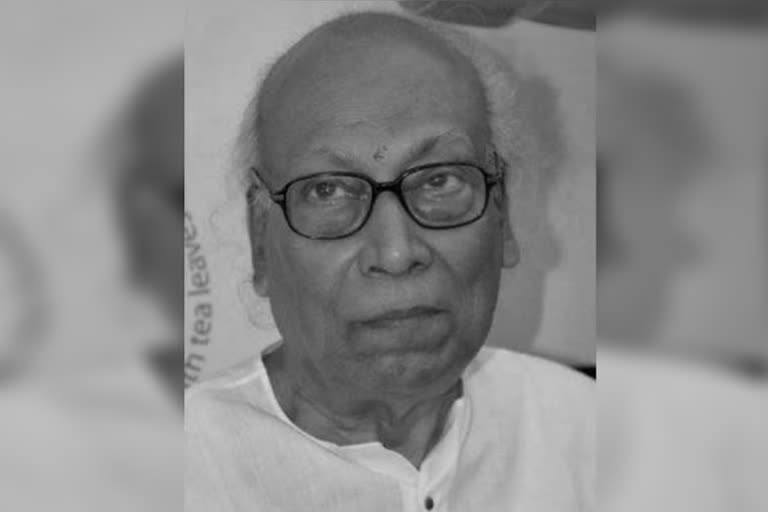Kolkata (West Bengal): “That you’re not here today is natural That you were here once, is unbelievable...”
Another glorious era ends. Noted Bengali poet and Padma Bhushan awardee Sankha Ghosh, who had tested COVID-19 positive recently, died on Wednesday at his residence in Kolkata. He was 89 and is survived by his wife Pratima and daughters Srabanti and Sremanti.
Ghosh, a doyen of Bengali literature, was a recipient of several literary awards like the Sahitya Academy Award, the Jnanpith Award, the Rabindra Puraskar, Desikottam Award and the Padma Bhushan.
Expressing grief over the death of the noted port, Chief Minister Mamata Banerjee said Ghosh’s death was an irreparable loss for the literary world. “I express my heartiest condolences to his family members,” she said in a message.
Prime Minister Narendra Modi took to Twitter to express his condolences at the demise of Ghosh. “Shri Shankha Ghosh will be remembered for his contributions to Bengali and Indian literature. His works were widely read and admired. Saddened by his demise. Condolences to his family and friends,” he tweeted.
READ: Bengali poet Shankha Ghosh dies of COVID-19
In a message, Union Home Minister Amit Shah said, “Anguished to learn about the sad demise of a renowned Bengali poet and Sahitya Akademi Awardee, Shri Shankha Ghosh Ji. He will always be remembered for his outstanding poems, deeply rooted in the social context. My deepest condolences to his family and followers.”
Born as Chittopriyo Ghosh on February 5, 1932 in the Chandpur district of today's Bangladesh, Shankha Ghosh had spent his earlier days in Pabna and later came to Kolkata where he graduated from the Presidency College and completed his post-graduation from the University of Calcutta. A noted Tagore exponent, Ghosh has always been revered for his bold approach in his poetries and expressing his protest against social injustice through his works.
He was a professor of Bengali literature at Kolkata's noted City College, Bangabashi College and later taught at the Jadavpur University. He had also taught at the Delhi University, Indian Institute of Advanced Studies and the Visva Bharati University.
According to poet Subodh Sarkar, Ghosh took Bengali literature to a different level. “He was one of the main reasons why we are still proud of Bengali as a language. He was not just a Bengali poet. He was truly an Indian poet. Poets and writers from other Indian states deeply regarded him,” remembered Sarkar.
Left Front chairman and CPI(M) Politburo member Biman Bose said Ghosh had always raised his voice against social ills like imperialism, communalism and even participated in a rally organized against communalism in Kolkata. “That voice gets silent today. I am deeply saddened,” Bose said.
READ: 'What about poll rallies in Bengal?' Naresh Tikait rebuts 'Covid-blame' on farmers
Literary workers feel that Ghosh’s poetries often carried different emotions of life, where an apparently romantic poem might convey the shades of revolution. An avid lover of silence, Ghosh often used to say silence will bring revolution and only silence will provide fodder to the soul.
The West Bengal government had planned to bid farewell to the litterateur with full state honours, but here also, Ghosh preferred silence over booming gun salutes. His last rites were performed today minus any state honours and in the presence of only a handful of family members. Since the poet was diagnosed as Covid-19 positive, his funeral took place following all Covid protocols.
The Covid-19 pandemic had already claimed some of modern-day Bengal's stalwarts. First, it was Pranab Mukherjee. Then it was Soumitra Chatterjee. And now Shankha Ghosh. Ghosh's departure truly draws curtains to one of the most revered and cherished periods in Bengali literature and poetry. The maestro left in silence leaving behind an acute silence in the Bengali literary world.
"Earth, dig a small grave for me, Let me hide my shame under the raw soil, Whatever secret blood is there in my body, Let every drop of it ripen the grains."
READ: Bengal has opportunity to speak for the country: Chidambaram



